|
|
|
Sort Order |
|
|
|
Items / Page
|
|
|
|
|
|
|
| Srl | Item |
| 1 |
ID:
108611
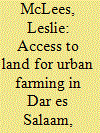

|
|
|
|
|
| Publication |
2011.
|
| Summary/Abstract |
People in sub-Saharan Africa rely on a variety of informal mechanisms to gain access to land for urban farming. However, the literature on land tenure focuses on gaining access to land for housing, whereas farming, which is highly visible in the urban landscape of Dar es Salaam, Tanzania, requires farmers to negotiate their access in ways distinct from housing. A close examination of four open-space farms in Dar es Salaam reveals that there are different methods of gaining access to land for farming as opposed to housing. Additionally, theorising this access reveals that the landowners who allow farmers on their land for food production also derive benefits. This can provide a framework for current efforts to integrate urban agriculture into the city zoning plans.
|
|
|
|
|
|
|
|
|
|
|
|
|
|
|
|
| 2 |
ID:
110108
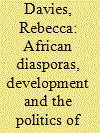

|
|
|
|
|
| Publication |
2012.
|
| Summary/Abstract |
This article seeks to add to the debate on the role of diasporas in development outcomes in sub-Saharan Africa by considering why diasporas are not apparently as effective as development agents in an African setting as they have proven thus far in other regions. It argues that changing diasporic engagement and activities on the continent should be examined against the backdrop of the emergence of a 'liberalisation from below' which emphasises local ownership of development outcomes, the historical variety of African state forms and the continuities in the exercise of power and the nature of these states. In so doing, it brings into focus the ongoing transformation in state-society relations whereby the dependence-of elites and ordinary citizens alike-on external resources continues to deepen, and the importance of this context in drawing any conclusions about the role of diasporas as agents of transformation.
|
|
|
|
|
|
|
|
|
|
|
|
|
|
|
|
| 3 |
ID:
112222
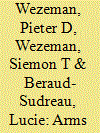

|
|
|
|
|
| Publication |
Sweden, SIPRI, 2011.
|
| Description |
vii, 49p.
|
| Series |
SIPRI Policy Paper No.30
|
| Standard Number |
9789185114696
|
|
|
|
|
|
|
|
|
|
|
|
Copies: C:1/I:0,R:0,Q:0
Circulation
| Accession# | Call# | Current Location | Status | Policy | Location |
| 056467 | 327.1740966/WEZ 056467 | Main | On Shelf | General | |
|
|
|
|
| 4 |
ID:
092842


|
|
|
|
|
| Publication |
2009.
|
| Summary/Abstract |
This paper analyses national, regional and international biofuels policies and strategies to assess whether these policies promote or undermine the development of biofuels sector in Africa. Despite having a huge comparative advantage in land, labour and good climatic conditions favourable for the growing of energy crops, few countries in Sub-Saharan Africa have included biofuels strategies in their energy or national development policies. Further results show that while developed countries commit huge financial resources for research, technology development and the provision of tax-incentives to both producers and consumers, there is little government support for promoting biofuels in Africa. Although the consequences of biofuels on food supply remain uncertain, the mandatory blending of biofuels with fossil fuels by industrialized countries will create demand for land in Africa for the growing of energy crops for biofuels. This paper urgently calls upon national governments in Sub-Saharan Africa to develop appropriate strategies and regulatory frameworks to harness the potential economic opportunities from biofuels sector development, while protecting the environment and rural communities from the adverse effects of land alienation from the mainstream agriculture towards the growing of energy crops for biofuels at the expense of traditional food crops.
|
|
|
|
|
|
|
|
|
|
|
|
|
|
|
|
| 5 |
ID:
164555
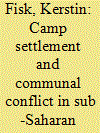

|
|
|
|
|
| Summary/Abstract |
Are areas that host encamped refugees more likely to experience communal conflict, and under what conditions? Building on insights from the refugee studies literature suggesting that settling refugees in camps can intensify intercommunal tension in host communities, this article investigates the effect of refugee encampment on the occurrence of communal conflict at the subnational level in sub-Saharan Africa. It first tests for a general relationship between the overall presence and population intensity of encamped refugees and communal conflict before assessing whether this relationship is moderated by local-level characteristics, including interethnic linkages and political and economic marginalization within the host region. The basic findings show that communal conflict occurs more frequently in regions where refugees are camp-settled. Tests for interactive effects indicate that refugee camps have a significant marginal effect on conflict only if they are located in areas with politically marginalized host groups. Origin country/host region ethnic ties are shown to exert significant moderating effects. Moreover, results from an extended set of analyses show that the form of refugee settlement matters, as the presence and population intensity of self-settled refugees are related to decreases in the occurrence of communal conflict.
|
|
|
|
|
|
|
|
|
|
|
|
|
|
|
|
| 6 |
ID:
116867
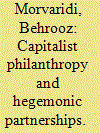

|
|
|
|
|
| Publication |
2012.
|
| Summary/Abstract |
Over the past 10 years individual capitalists have become increasingly involved in philanthropy, setting up charitable foundations targeted at helping to reduce social problems such as poverty, disease and food security. This form of neoliberal capitalist philanthropy is both politically and ideologically committed to market-based social investment through partnerships, to make the market work or work better for capital. The new structures of philanthropy have received much praise in the media for imbuing capitalist business principles into the non-profit sector and for their potential for social transformation. While philanthropic activities may be considered worthy in themselves, this article examines the relationship between giving and business interest and the agency associated with neoliberal capitalist philanthropy. It questions partnerships between philanthropists and private corporations and their motivations for engaging in poverty-related philanthropy. The discussion focuses on capitalist philanthropic foundations' involvement in the process of agricultural commodification in sub-Saharan Africa through the New Green Revolution and genetically modified (gm) technologies.
|
|
|
|
|
|
|
|
|
|
|
|
|
|
|
|
| 7 |
ID:
110195
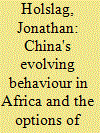

|
|
|
| 8 |
ID:
109142
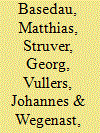

|
|
|
|
|
| Publication |
2011.
|
| Summary/Abstract |
Theoretically, the "mobilization hypothesis" establishes a link between religion and conflict by arguing that particular religious structures are prone to mobilization; once politicized, escalation to violent conflict becomes more likely. Yet, despite the religious diversity in sub-Saharan Africa and the religious overtones in a number of African conflicts, this assumption has not yet been backed by systematic empirical research on the religion-conflict nexus in the region. The following questions thus remain: Do religious factors significantly impact the onset of (religious) armed conflict? If so, do they follow the logic of the mobilization hypothesis and, if so, in which way? To answer these questions, this article draws on a unique data inventory of all sub-Saharan countries for the period 1990-2008, particularly including data on mobilization-prone religious structures (e.g., demographic changes, parallel ethno-religious identities) as well as religious factors indicating actual politicization of religion (e.g., inter-religious tensions, religious discrimination, incitement by religious leaders). Logit regressions suggest that religion indeed plays a significant role in African armed conflicts. These findings are compatible with the mobilization hypothesis, and stress the impact of conflict-prone religious structures, and particularly, the fact that overlaps of religious and ethnic identities are conflict-prone. Future research should investigate the religion-ethnicity-nexus in more detail.
|
|
|
|
|
|
|
|
|
|
|
|
|
|
|
|
| 9 |
ID:
113554
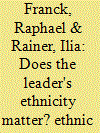

|
|
|
|
|
| Publication |
2012.
|
| Summary/Abstract |
In this article we reassess the role of ethnic favoritism in sub-Saharan Africa. Using data from 18 African countries, we study how the primary education and infant mortality of ethnic groups were affected by changes in the ethnicity of the countries' leaders during the last 50 years. Our results indicate that the effects of ethnic favoritism are large and widespread, thus providing support for ethnicity-based explanations of Africa's underdevelopment. We also conduct a cross-country analysis of ethnic favoritism in Africa. We find that ethnic favoritism is less prevalent in countries with one dominant religion. In addition, our evidence suggests that stronger fiscal capacity may have enabled African leaders to provide more ethnic favors in education but not in infant mortality. Finally, political factors, linguistic differences, and patterns of ethnic segregation are found to be poor predictors of ethnic favoritism.
|
|
|
|
|
|
|
|
|
|
|
|
|
|
|
|
| 10 |
ID:
094913
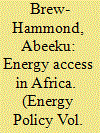

|
|
|
|
|
| Publication |
2010.
|
| Summary/Abstract |
This paper presents a review of the current situation and projections for energy access in Africa. The paper also presents several sets of ambitious energy access targets as agreed by the regional groupings within the region. The paper argues that achieving between 50% and 100% access to modern energy services by 2030 in Africa will require more effective mobilization and use of both domestic and external funding, and the development and implementation of innovative policy frameworks. The paper suggests that greater emphasis will need to be placed on productive uses of energy and energy for income generation in order to break the vicious circle of low incomes leading to poor access to modern energy services, which in turn puts severe limitations on the ability to generate higher incomes. The paper further suggests that if anything near the ambitious targets set by African organisations are to be achieved then it will be advisable to tap into the full menu of energy resource and technology options, and there will be the need for significant increases in the numbers of various actors involved together with more effective institutions in the energy sector.
|
|
|
|
|
|
|
|
|
|
|
|
|
|
|
|
| 11 |
ID:
094943
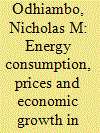

|
|
|
|
|
| Publication |
2010.
|
| Summary/Abstract |
In this paper we examine the causal relationship between energy consumption and economic growth in three sub-Saharan African countries, namely South Africa, Kenya and Congo (DRC). We incorporate prices as an intermittent variable in a bivariate setting between energy consumption and economic growth-thereby creating a simple trivariate framework. Using the ARDL-bounds testing procedure, we find that the causality between energy consumption and economic growth varies significantly across the countries under study. The results show that for South Africa and Kenya there is a unidirectional causal flow from energy consumption to economic growth. However, for Congo (DRC) it is economic growth that drives energy consumption. These findings have important policy implications insofar as energy conservation policies are concerned. In the case of Congo (DRC), for example, the implementation of energy conservation policies may not significantly affect economic growth because the country's economy is not entirely energy dependent. However, for South Africa and Kenya there is a need for more energy supply augmentations in order to cope with the long-run energy demand. In the short-run, however, the two countries should explore more efficient and cost-effective sources of energy in order to address the energy dependency problem.
|
|
|
|
|
|
|
|
|
|
|
|
|
|
|
|
| 12 |
ID:
113180
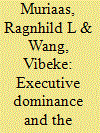

|
|
|
|
|
| Publication |
2012.
|
| Summary/Abstract |
Quota policies securing the presence of marginalised groups in decision-making bodies have been adopted across sub-Saharan Africa. These policies are frequently understood through the lens of a pluralist perspective. This stance is not appropriate in African regimes characterised by executive dominance. Through a qualitative study of official documents, newspaper articles and interviews conducted during two field studies in Uganda in 2005 and 2010, this article shows how the understanding of quota policies in Africa may gain from the corporatist debate on interest representation. The analysis reveals that the incumbent National Resistance Movement has employed the reserved seat policy strategically to maintain its dominant position, and that strategies for using the quota system have evolved gradually over time in response to key political events, and the interests of group activists at the local and national levels with vested interests in its survival.
|
|
|
|
|
|
|
|
|
|
|
|
|
|
|
|
| 13 |
ID:
099823
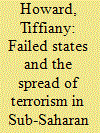

|
|
|
|
|
| Publication |
2010.
|
| Summary/Abstract |
Plagued by systematic state failure, sub-Saharan Africa's failed states have helped facilitate internationally sponsored terrorist networks and operations. However, until recently, this type of activity was primarily relegated to North Africa and the Horn. But that has begun to change. Now, what was once a seemingly benign terrorist presence in sub-Saharan Africa is starting to transform into a movement, with states such as Nigeria, Sierra Leone, Liberia, and the Democratic Republic of the Congo (DRC) now lending arms, financial support, and radical militants to the extremist jihadist movement of internationally sponsored terrorist organizations such as Al Qaeda. Further, with the recent bombings in Kenya and Somalia, and the failed bombing attempt on a U.S. airliner by a Nigerian national, it is becoming increasingly evident that internationally sponsored terrorist networks have found a permanent home in sub-Saharan Africa and within the hearts and minds of its people, which poses significant challenges for the international community, given the region's patchwork of failed states, where terrorists can easily hide and thrive. Consequently, this study discusses how the conditions of state failure have fostered support for internationally sponsored terrorism in sub-Saharan Africa. Terrorist groups are now actively recruiting more militants from within the region and popular support for extremist acts is on the rise in sub-Saharan Africa. Thus, the article argues sub-Saharan Africa will soon become the site for the next generation of terrorists, and the next wave of terrorist activity.
|
|
|
|
|
|
|
|
|
|
|
|
|
|
|
|
| 14 |
ID:
122026
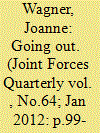

|
|
|
| 15 |
ID:
102425
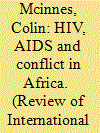

|
|
|
|
|
| Publication |
2011.
|
| Summary/Abstract |
The causes and consequences of HIV and AIDS are social are well as biomedical. Given the scale of the pandemic, understanding the social dimensions of HIV and AIDS is vital. One key argument is that there is a link between conflict and the spread of HIV. This appears to be particularly the case for sub-Saharan Africa where high levels of HIV prevalence are matched by violent conflict and state instability. Recent evidence however suggests that HIV prevalence does not always increase in conflict and that in some instances it may even reduce. This article attempts to explain why HIV has not increased in some sub-Saharan conflicts. To do this it moves beyond the use of risk factors to offer a new explanation based on susceptibility and vulnerability. It uses this explanation to examine four cases - Sierra Leone, Angola, Rwanda and the Democratic Republic of the Congo (DRC) - where conflict did not lead to a significant increase in the prevalence of HIV. The article concludes that, despite the fears of a few years ago, conflict does not readily act as a vector for the spread of HIV, though the potential for this to occur does still exist under certain circumstances.
|
|
|
|
|
|
|
|
|
|
|
|
|
|
|
|
| 16 |
ID:
139793
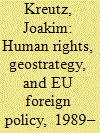

|
|
|
|
|
| Summary/Abstract |
Is foreign policy influenced by humanitarian concerns, or are concepts such as human security merely rhetoric for traditional power politics? Using a multilevel modeling technique and a unique data set of military and economic European Union (EU) intervention 1989–2008, I find that military and economic interventions by the EU are conducted in response to humanitarian atrocities but that geostrategic concerns also influence EU action. While the EU consistently is more likely to act against countries with greater civilian victimization, the size of the effect is influenced by spatial considerations. The EU is most attentive to human rights violations in non-EU European states, followed by countries in sub-Saharan Africa, while it has been least active in Asia and the Americas.
|
|
|
|
|
|
|
|
|
|
|
|
|
|
|
|
| 17 |
ID:
180935
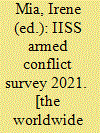

|
|
|
|
|
| Publication |
Oxon, Routledge, 2021.
|
| Description |
400p.pbk
|
| Standard Number |
9781032171852
|
|
|
|
|
|
|
|
|
|
|
|
Copies: C:1/I:0,R:0,Q:0
Circulation
| Accession# | Call# | Current Location | Status | Policy | Location |
| 060053 | 355.0205/MIA 060053 | Main | On Shelf | General | |
|
|
|
|
| 18 |
ID:
192643
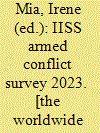

|
|
|
|
|
| Publication |
Oxon, Routledge, 2023.
|
| Description |
340p.pbk
|
| Standard Number |
9781032736709
|
|
|
|
|
|
|
|
|
|
|
|
Copies: C:1/I:0,R:1,Q:0
Circulation
| Accession# | Call# | Current Location | Status | Policy | Location |
| 060456 | 355.0205/MIA 060456 | Main | On Shelf | Reference books | |
|
|
|
|
| 19 |
ID:
132339
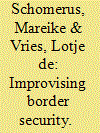

|
|
|
|
|
| Publication |
2014.
|
| Summary/Abstract |
This article compares two cases of securitization along South Sudan's border with the Democratic Republic of the Congo. By comparing how a security concern - the presence of the Lord's Resistance Army - was interpreted and responded to, the article shows that border security practices in two borderscapes are improvised, contradictory and contested, and serve to establish authority rather than actually securing the border. This is apparent on three levels: (a) through the multiplicity of security actors vying for authority; (b) in how they interpret security concerns; and (c) in terms of what practice follows. The article argues that by allowing authority at the border to be taken by actors that are not under direct control of the central government, the South Sudanese state is developing as one that controls parts of the country in absentia, either by granting discretionary powers to low-level government authorities at the border or through tactical neglect. Processes of securitization by both state and non-state actors in the borderland are largely disconnected from the South Sudanese central government, which does not claim authority over this border and thus seemingly does not consider the lack of security for its citizens, and the parallel authorities, as a threat to central stability.
|
|
|
|
|
|
|
|
|
|
|
|
|
|
|
|
| 20 |
ID:
102402
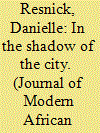

|
|
|
|
|
| Publication |
2011.
|
| Summary/Abstract |
Sub-Saharan Africa is the fastest urbanising region of the world. This demographic transformation has occurred in concert with two other trends in the region, nascent democratisation and stalled decentralisation. Using the case of Lusaka, Zambia, this study argues that in the context of multi-party competition and limited fiscal decentralisation, the challenges posed by rapid urbanisation are exacerbated for the urban poor living in cities controlled by opposition parties. Semi-structured interviews conducted with local political actors are combined with a survey of 200 informal sector workers in Lusaka. This data reveals the tactics employed by the central government to weaken the popularity of the opposition in Lusaka and shows that from the viewpoint of the urban poor, such tactics ultimately prove counterproductive. The presence of similar dynamics in other African cities has important implications for aid modalities, such as budget support, that are currently used by international donors to fund development projects, including those in the urban sector.
|
|
|
|
|
|
|
|
|
|
|
|
|
|
|
|
|
|
|
|
|